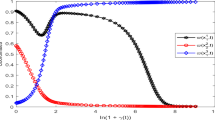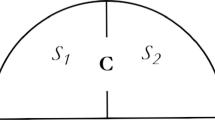Abstract
The concept of program equilibrium, introduced by Howard (Theory and Decision 24(3):203–213, 1988) and further formalised by Tennenholtz (Game Econ Behav 49:363–373, 2004), represents one of the most ingenious and potentially far-reaching applications of ideas from computer science in game theory to date. The basic idea is that a player in a game selects a strategy by entering a program, whose behaviour may be conditioned on the programs submitted by other players. Thus, for example, in the prisoner’s dilemma, a player can enter a program that says “If his program is the same as mine, then I cooperate, otherwise I defect”. It can easily be shown that if such programs are permitted, then rational cooperation is possible even in the one-shot prisoner’s dilemma. In the original proposal of Tennenholtz, comparison between programs was limited to syntactic comparison of program texts. While this approach has some considerable advantages (not the least being computational and semantic simplicity), it also has some important limitations. In this paper, we investigate an approach to program equilibrium in which richer conditions are allowed, based on model checking—one of the most successful approaches to reasoning about programs. We introduce a decision-tree model of strategies, which may be conditioned on strategies of others. We then formulate and investigate a notion of “outcome” for our setting, and investigate the complexity of reasoning about outcomes. We focus on coherent outcomes: outcomes in which every decision by every player is justified by the conditions in his program. We identify a condition under which there exist a unique coherent outcome. We also compare our notion of (coherent) outcome with that of (supported) semantics known from logic programming. We illustrate our approach with many examples.
Similar content being viewed by others
References
Apt KR (1990) Logic programming. In: van Leeuwen J. (ed) Handbook of theoretical computer science, vol B: formal models and semantics (B). Elsevier/MIT Press, Amsterdam/Cambridge, pp 493–574
Axelrod R (1980) Effective choice in the prisoner’s dilemma. J Confl Resolut 24: 3–25
Axelrod R (1984) The evolution of cooperation. Basic Books, New York
Bidoit N, Hull R (1989) Minimalism, justification and non-monotonicity in deductive databases. J Comput Syst Sci 38(2): 290–325
Binmore K (1994) Game theory and the social contract, vol 1: playing fair. The MIT Press, Cambridge
Binmore K (1998) Game theory and the social contract, vol 2: just playing. The MIT Press, Cambridge
Clarke EM, Grumberg O, Peled DA (2000) Model checking. The MIT Press, Cambridge
Emerson EA (1990) Temporal and modal logic. In: van Leeuwen J (ed) Handbook of theoretical computer science, vol B: formal models and semantics. Elsevier, Amsterdam, pp 996–1072
Ferraris P, Lifschitz V (2005) Mathematical foundations of answer set programming. In: Artemov Sergei N, Barringer H, d’Avila Garcez AS, Lamb LC, Woods J (eds) We will show them! (1). College Publications, London, pp 615–664
Fitting M (2002) Fixpoint semantics for logic programming. a survey. Theor Comput Sci 278(1–2): 25–51
Fortnow L (2009) Program equilibria and discounted computation time. In: Proceedings of the twelfth conference on theoretical aspects of rationality and knowledge (TARK-09), Palo Alto, CA
Gelfond M (2008) Answer sets. In: Lifschitz V, van Harmelen F, Porter B (eds) Handbook of knowledge representation, vol 3 of Foundations of artificial intelligence. Elsevier, Amsterdam, pp 285–316
Howard JV (1988) Cooperation in the prisoner’s dilemma. Theory Decis 24(3): 203–213
Kalai AT, Kalai E, Lehrer E, Samet D (2010) A commitment folk theorem. Games Econ Behav 69(1): 127–137
Lloyd JW (1987) Foundations of logic programming, 2nd edn. Springer, Heidelberg
Osborne MJ, Rubinstein A (1994) A course in game theory. The MIT Press, Cambridge
Papadimitriou CH (1994) Computational complexity. Addison-Wesley, Reading
Peters M, Szentes B (2008) Definable and contractible contracts. Unpublished Working Paper
Tennenholtz M (2004) Program equilibrium. Games Econ Behav 49: 363–373
Author information
Authors and Affiliations
Corresponding author
Rights and permissions
About this article
Cite this article
van der Hoek, W., Witteveen, C. & Wooldridge, M. Program equilibrium—a program reasoning approach. Int J Game Theory 42, 639–671 (2013). https://doi.org/10.1007/s00182-011-0314-6
Received:
Accepted:
Published:
Issue Date:
DOI: https://doi.org/10.1007/s00182-011-0314-6
Keywords
- Program equilibrium
- Non-cooperative games
- Repeated games
- Logic programming
- Programs as strategies
- Equality of programs




